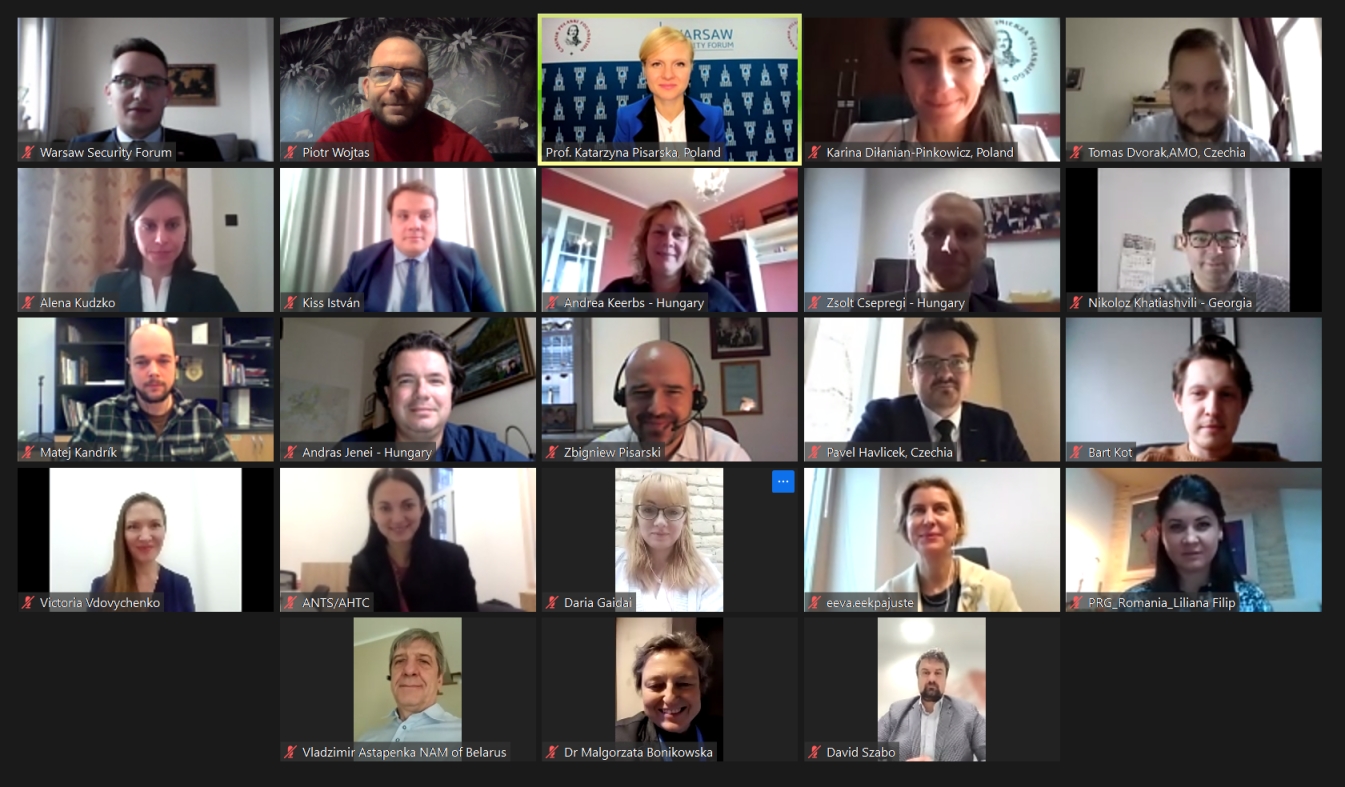
WSF Democracy Network
Autor foto: Fundacja im. Kazimierza Pułaskiego
Warsaw Security Forum Democracy Network – new regional pro-democracy initiative
Opublikowano: 7 grudnia, 2021

WSF Democracy Network
Autor foto: Fundacja im. Kazimierza Pułaskiego
Warsaw Security Forum Democracy Network – new regional pro-democracy initiative
Opublikowano: 7 grudnia, 2021
On Tuesday, Dec 7, the Casimir Pulaski Foundation launched its new initiative. The Warsaw Security Forum Democracy Network will be a platform for Central and Eastern European civil society and expert organizations to discuss and develop joint projects.
The WSF Democracy Network is designed to support Casimir Pulaski Foundation’s partners to reach out and inform a broader audience of policy-makers, opinion-shapers, scholars and community leaders about the importance of upholding democratic principles in security policy – particularly in times of security crisis.
Prof. Katarzyna Pisarska – the initiator of the Network says: We are aware that the fight for democracy is closely linked with the current political events and civil society developments. This December President Biden will host the first Summit for Democracy and we want to send a strong signal to his Administration – ‘we are ready to contribute to the process in our Region’.
Twenty representatives of the civil society from Belarus, Czechia, Estonia, Hungary, Latvia, Lithuania, Poland, Russia, Slovakia and Ukraine met today online to initiate the project designed to amplify the voice of organizations fighting for the integrity of the democratic process. We have the necessary expertise, we have a group of dedicated individuals and we believe that through close collaboration we can put forward some tangible pledges to fight for democracy in our respective countries, emphasized Prof. Pisarska.
The four priorities set before the Network are:
- to gather like-minded individuals involved in democracy-building and democracy-strengthening projects;
- to share and explore ongoing projects related to strengthening regional democratic resilience;
- to brainstorm and possibly contribute to joint collaborative projects with international organizations;
- to influence the Warsaw Security Forum’s 2022 agenda on democracy-related issues.
The network has been established with the support of the National Endowment for Democracy (USA).
The network is comprised of the following individuals:
- dr Bonikowska Małgorzata Centre for International Relations, Poland
- Csepregi Zsolt Antall József Knowledge Centre, Hungary
- Dvořák Tomáš Association for International Affairs, Czech Republic
- Eek-Pajuste Eeva Lennart Meri Conference ICDS, Estonia
- Filip Liliana Political Research Group, Romania
- Gaidai Daria Office of Deputy Prime Minister of Ukraine; Institute of World Policy, Ukraine
- Havlicek Pavel Association for International Affairs, Czech Republic
- Hopko Hanna ANTS Network, Ukraine
- Jenei Andras KBA Central European Safety Training and Research Center, Hungary
- Kaleniuk Daria Anticorruption Action Centre, Ukraina
- Kandrik Matej STRATPOL – Strategic Policy Institute, Slovakia
- Keerbs Andrea International Republican Institute, Hungary
- Khatiashvili Nikoloz Parliament of Georgia; GEOCASE; Tbilisi State University, Georgia
- Kiss Istvan Danube Institute, Hungary
- Kudzko Alena GLOBSEC, Belarus
- Latushka Pavel National Anti-Crisis Management, Belarus
- Prat Sarka Institute for Politics and Society, Czech Republic
- Szabo David Jozsef Trimarium Institute, Hungary
- Vdovychenko Victoria PROTECT, Ukraine
- Viacorka Franak Office of Sviatlana Tsikhanouskaya, Belarus
On Tuesday, Dec 7, the Casimir Pulaski Foundation launched its new initiative. The Warsaw Security Forum Democracy Network will be a platform for Central and Eastern European civil society and expert organizations to discuss and develop joint projects.
The WSF Democracy Network is designed to support Casimir Pulaski Foundation’s partners to reach out and inform a broader audience of policy-makers, opinion-shapers, scholars and community leaders about the importance of upholding democratic principles in security policy – particularly in times of security crisis.
Prof. Katarzyna Pisarska – the initiator of the Network says: We are aware that the fight for democracy is closely linked with the current political events and civil society developments. This December President Biden will host the first Summit for Democracy and we want to send a strong signal to his Administration – ‘we are ready to contribute to the process in our Region’.
Twenty representatives of the civil society from Belarus, Czechia, Estonia, Hungary, Latvia, Lithuania, Poland, Russia, Slovakia and Ukraine met today online to initiate the project designed to amplify the voice of organizations fighting for the integrity of the democratic process. We have the necessary expertise, we have a group of dedicated individuals and we believe that through close collaboration we can put forward some tangible pledges to fight for democracy in our respective countries, emphasized Prof. Pisarska.
The four priorities set before the Network are:
- to gather like-minded individuals involved in democracy-building and democracy-strengthening projects;
- to share and explore ongoing projects related to strengthening regional democratic resilience;
- to brainstorm and possibly contribute to joint collaborative projects with international organizations;
- to influence the Warsaw Security Forum’s 2022 agenda on democracy-related issues.
The network has been established with the support of the National Endowment for Democracy (USA).
The network is comprised of the following individuals:
- dr Bonikowska Małgorzata Centre for International Relations, Poland
- Csepregi Zsolt Antall József Knowledge Centre, Hungary
- Dvořák Tomáš Association for International Affairs, Czech Republic
- Eek-Pajuste Eeva Lennart Meri Conference ICDS, Estonia
- Filip Liliana Political Research Group, Romania
- Gaidai Daria Office of Deputy Prime Minister of Ukraine; Institute of World Policy, Ukraine
- Havlicek Pavel Association for International Affairs, Czech Republic
- Hopko Hanna ANTS Network, Ukraine
- Jenei Andras KBA Central European Safety Training and Research Center, Hungary
- Kaleniuk Daria Anticorruption Action Centre, Ukraina
- Kandrik Matej STRATPOL – Strategic Policy Institute, Slovakia
- Keerbs Andrea International Republican Institute, Hungary
- Khatiashvili Nikoloz Parliament of Georgia; GEOCASE; Tbilisi State University, Georgia
- Kiss Istvan Danube Institute, Hungary
- Kudzko Alena GLOBSEC, Belarus
- Latushka Pavel National Anti-Crisis Management, Belarus
- Prat Sarka Institute for Politics and Society, Czech Republic
- Szabo David Jozsef Trimarium Institute, Hungary
- Vdovychenko Victoria PROTECT, Ukraine
- Viacorka Franak Office of Sviatlana Tsikhanouskaya, Belarus
